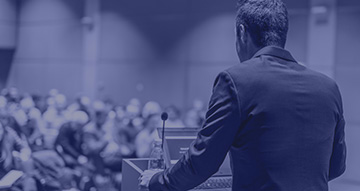Beyond CSR: Creating Shared Value and Building Sustainable Social Ecosystems
By Rati Forbes, Head, Forbes Marshall Foundation |Mar 01, 2022
Learn how to make a gainful impact on society while also building capacity within an organisation. Tune in to our podcast with Rati Forbes of Forbes Foundation.
Beyond CSR: Creating Shared Value and Building Sustainable Social Ecosystems
Rati Forbes, Head, Forbes Marshall Foundation
Looking out for those who help us in our growth trajectory is the key to evaluating success. And this is especially true for businesses. But are today’s corporates tuned in to the needs of those who contribute to their continuing success? Some are, if not all, and these few go beyond their mandated corporate social responsibility to create shared value. Listen to Rati Forbes, Head of Forbes Marshall Foundation, as she shares her experience in creating shared value with like-minded corporates.
TRANSCRIPT
Smriti Sharma: 00:03
Economic growth and societal needs go hand in hand. As businesses progress, they are expected to address some of these needs such as education, health care affordable housing environment of those around them. Given that we are witnessing a game shift from pure corporate philanthropy and corporate social responsibility to the idea of creating shared value, a concept first developed by Michael E. Porter and Mark Kramer in 2011. A decade later, not only is this concept gaining momentum and its execution for the larger benefit of the public, but also is far more crucial than ever. Hi, I'm Smriti Sharma representing ISB’s management rethink—an online management practice journal published bi- monthly by the Centre for Learning and Management Practice. In today's session, as we discuss the need to adopt the shared value approach and some of the more burning questions around this topic, we at Management ReThink are excited to have with us Rati Forbes, who heads the Forbes Foundation and is responsible for CSR and foundation activities across the Forbes Marshall group. Welcome to ISB Management ReThink’s podcast Rati. Could you start by shedding some light on this transition and why it is imperative today more than ever.
Rati Forbes: 01: 20
Thank you so much.It's a pleasure being here with you all. I really believe that inclusive growth is key to India's long-term development. It's really a no brainer that all sections of society participate in the development process. As without this, not only would economic development be excluding a huge and very important proportion of our population, but growth would never really reach its fullest potential. And I think now more than ever, industry has a direct responsibility to drive this agenda in every value-based ethical way possible. It's not just a good thing for industry to do, but it's in its best business interest as well. And we all know that COVID has only exacerbated the vulnerabilities in so many ways in society. So, issues like improving education outcomes, skilling, affirmative action, increasing female participation in the workforce, and a new social contract to cover most of our most vulnerable of labor force are some of the key issues I believe, we in industry have to focus on. I also think that companies need to focus on corporate social responsibility, not just because it has been mandated or made the law, but because it's our responsibility as good citizens. This is a philosophy actually in our own company that we have followed really since the late 60s, when my father-in-law first purchased the land from the farmers and set up the first factory. He strongly believed in the ethos of contributing meaningfully to the society we were now going to be a part of. And this was long before any kind of laws on CSR were around. Some of the earliest interventions that he thought were important to do, for example, family of the farmers were trained for shopfloor responsibilities, he supported better housing infrastructure in the community with individual toilets. He made sure that wives or women were trained in different skills, as he always believed that women played a key role as change maker in families. And we also had two social workers actually on our rolls in the 60s, much before all these approaches became the norm or were mandated. Now you will ask, where does this fit into business? But as you can well imagine, this has supported and helped our business in a myriad of ways.
Smriti Sharma: 04:05
You know, how the traditional mindset believes that businesses can either do good or be profitable. What are some of the challenges and barriers and adopting such an approach to business? And how can corporates align their business objectives to solve social problems and yet maintain their competitive edge that allows them to maximise shareholder value in today's time?
Rati Forbes: 04:26
Sure, thank you. I'll first start with the challenges and limitations. There have been mindset changes, there have been shifts in attitudes, which are really good to see. And as a result, of course, positive impacts has happened. But I do believe that industry as a voice and as a powerful voice needs to focus on at least three aspects. The first is advocacy. While governments, businesses, NGOs, we can all work together to create varied initiatives, somewhere, these have to be perceived as useful and scalable. We need to create awareness about them, and demonstrate the utility of these programmes, and advocacy and awareness generation are key. And in the right circles as well, when I talk about advocacy. Second is supporting creative, innovative solutions. This is something that our foundation also supports in a very major way, even within a large NGO, if they want to pilot something that is innovative and creative, we give them the support for that. And we have many fine examples, especially in education and health, where we have supported an NGO, and where we have found that that has scaled, it has gone across different states, and even international foundations, in some cases have supported that initiative. And third, and finally, supporting capacity building of a varied kind in underserved, and more remote communities of our country, in a more thoughtful manner can lead to more sustainable impact. And by that, I mean, we need to understand needs, especially in rural and semi-rural communities, listen to the voice over there, and then help to build capacity in the way of leadership, in the way of basic skills such as financial management, the training of people, and so on and so forth. This leads only to more long-term, and positive impact and sustainable impact as well. You asked me for one actual example, and I will go to that, where we have looked at business and community and where it has been a win-win, I would believe for both. This is an initiative which we have termed as our shared value initiative or the shared value approach. In our company, it's been in place for the past three years. This approach was conceptualised with the intention of helping young engineers who are from socially or economically vulnerable families, especially from semi-rural areas, enhance their skills, and enabling them to find jobs and have careers. The second consideration, of course, was that needed to have a positive impact on our own business. And to that end, we have conversations internally, trying to understand opportunities and challenges in our business. One of the first ones we zeroed in on was the annual maintenance contracts. So, as we were unable to effectively service the customer with an AMC or an annual maintenance contract, like the site where the installation was very far and remote, we could not spare people from our head office team to travel all the way. Sometimes it was a very simple issue, and it really wasn't worth the time and effort. And it was almost a drain on the resources of our company. But so, what we've done is with the help of local NGOs, we have trained batches of engineers in different parts of the country where we have sites. This training is over a three-month period. And on completion of the training, I'm really delighted to say that 96% have been either absorbed by third party contractors, they have become entrepreneurs on their own. And they continue to service our requirements too, at local sites. And what we do is nine to twelve months after the conclusion of training, we track qualitative as well as quantitative indicators and, in every case, there's been a positive impact. So, we look at enhancement of income, we look at qualitative indicators in their own homes, what has changed as a result of this?
Smriti Sharma: 08:57
Did you also find it challenging to convince the parents and the families of these children to send their youth to get trained and skilled?
Rati Forbes: 09:07
I think it strangely we found that the challenge was really one where there was a thirst for knowledge, and there was a thirst for livelihood. When you're in a very vulnerable situation, I think, income, any amount, any steady source of income is a very important one, obviously. We also found that it was interesting in certain geographies, that the local youth wanted to stay there only, whereas in others, like for example, our batch from Pune, they were ready to move out. So, we have found that if we want to continue this kind of a model, it's good to recruit people from local areas because more often than not, there is a comfort level in your own local area. And I think in India as well, we are not still a very migratory kind of a population like in the US, you hear of people changing cities for five or like six times. You don't hear of that so often in India. So, yes.
Smriti Sharma: 10:19
And did you find it more challenging to convince the parents of the females? Because when we talk about traditional mindsets, there is a lot of reluctance among parents of the females to send their girls out.
Rati Forbes: 10:34
So, we definitely found that all our batches, quite honestly had many more men. But we find a changing trend. So, as I said, the most recent batch in Pune, there were an equal number of women and men, and the women were also as ready to move out and go to site, etc. In fact, I think that they are ready but society and within the factories, we have to be ready also and shift our mindset a little bit around these issues.
Smriti Sharma: 11:11
Very true. Changing mindsets require factoring in both societal and organisational aspects. Moving on, how can corporates today don the role of change agents in achieving a collective impact driving the next wave of innovation and productivity in the global economy? And can you also highlight the role of other stakeholders and partners, especially the government, and the third sector in helping achieve this collective impact?
Rati Forbes: 11:34
We have always believed that it's really beneficial to work alongside local government bodies, NGOs, as well as CBOs— those are smaller community-based organisations. Sometimes it is a more long winded and a bit frustrating. But I think corporates have to realise the importance of working with governments. And honestly, I think in 85 to 90% of cases, our experience has been extremely positive. A recent example, which I can give you Smriti, is the social compact initiative, which broadly aspires to ensure greater dignity and equity for.. the hope is for one million informal workers, working with ecosystems of companies across the country. We were one of the first companies to sign up for this initiative. It is so far in three cities, Mumbai, Pune and Ahmedabad. Basically, it was born out of the terrible plight we all witnessed on TV, and in the media, of migrant workers traversing unimaginable distances during the lockdown. And we all read those statistics that 78% of them had less than 300 rupees left in their pockets. 50% had rations left for less than one day. I could go on and on and about the shameful data we all read about and saw on TV, and the images we saw on TV. So, as a response to this, industry, NGO, and industry bodies and sector experts have come together. The key outcomes that we're all working towards are ensuring dignified living wages, maximising safety, ensuring health, gender equality, social security, and measures around that. We have taken steps in the last 18 months, we have set up already a migrant facilitation centre in the area where our main factory is, in Khed. And what is unique about our migrant facilitation centre is, it's not a static one. It's a mobile one as well. Again, it has been partnered with the Tata company and us. So, the Tata company provides the travel, the mobile van, and in the last six months already, there has been much impact. And when I talk about impact, it's helping migrants obtain basic cards such as Aadhaar, caste certificates, which are a must, before any scheme that they apply for can kick in. We've also had camps on Sundays, and on holidays and late in the evening to raise awareness about the various government schemes that are applicable to them, and then helping them to catalyse those schemes as well. Unless you have those base documents, sometimes that's not even known. Then, also this mobile facility service has delivered legal redressal where wages sometimes have not been paid, and so on and so forth. I really think more industries need to sign up. Size of industry, geography of the industry does not matter. We all need to come together somewhere to right this situation as well as we cannot expect government alone to work on this. So, it needs a collective action of NGOs, who are already working in this space, industries, industry bodies, so that we can have more and more industries coming together. And we found that it takes on different hues and colors depending on also the geography of our country, as well as the size of industry. So, one size can’t fit all. But I think it's an imperative for all of us whether even in small and medium sized enterprises to step up and do something about this issue.
Smriti Sharma: 15:37
You spoke about COVID, and rightly so. Would you also say that COVID gave the nudge that was needed for a long time for things to move in this direction?
Rati Forbes: 15:48
Yes, I think COVID has really pushed many different players in society to think about issues in a different manner. So, I mentioned about the social compact, it's also many foundations have come together, where they are supporting small and medium sized NGOs. These NGOs had made a huge impact during COVID as we know. Distributing of rations or making sure that health parameters or medicines reached the most vulnerable in the most remote communities and smallest villages of our country. So, it was very clear that this kind of collective action has to really be pushed more and more into just our overall thinking and approach. And we've seen, honestly, during COVID, that it was that that made the greatest impact, and not when entities worked on a single basis. In fact, no entity really could manage to work just on its own, especially during this pandemic.
Smriti Sharma: 17:08
Yeah, true. And I think that is not just true for developing countries like ours, that is also true for developed nations, like the US and the UK. They all struggled, it's not like it is just an India story.
Rati Forbes: 17:19
Correct and propelled many to take action, where they have not taken action earlier. And I only hope it sustain and continues.
Smriti Sharma: 17:30
So, while adopting the shared value approach, I was wondering if the size and the nature of the organisation matters?
Rati Forbes: 17:39
I think, again, anybody can start. Even, you know, it is not common in engineering companies like ours to have this kind of an approach. We've heard about it in FMCGs, and we just had never considered it, honestly, within our own company. But only after we dialogued for a long time with people within our business verticals, did we realise that there are so many of these simple needs, that can be taken care of, by less fortunate by more vulnerable people, but at the same time, making sure that there was value to businesses as well. And I gave you only the example of the annual maintenance contract, within this year, for example, we will be rolling out two or three different versions of this. So, at the bedrock is still the shared value approach but taking that approach, we're looking at different areas that we can work in, with a similar vision.
Smriti Sharma: 18:48
Okay. Do you also feel that in certain sectors, in certain industries, this is more needed today than anywhere else? Like for instance, you said a lot of FMCG companies have been doing it from the very beginning and for engineering companies like even yours, to adopt such an approach was unheard of. So, do you feel there are any specific industry sectors which should be adopting this approach? Right away?
Rati Forbes: 19:11
Absolutely. I think it's very doable. It's very, very doable. It just requires a little more thought. And honestly let me speak for myself. Five years ago, we had not given this much thought. But really, we thought this is not possible to do in an in a company like ours. And we have really made great headway in the last three years. And the hope is that the money or the financial return that the company has got, will go back into actually grant making and philanthropy rather than..as it grows, some could go back into company returns as well. But for now, we are hoping that whatever has come back, will go into further grant makings from our foundation.
Smriti Sharma: 19:58
Absolutely. As you have been in this field of creating a social impact through philanthropy and its related activities for over six decades now, and your family's equally involved. So what according to you are three key elements which are essential for success in the journey of creating a shared value and collective impact? Like, if someone were to replicate your business model, what lessons would you like to give them?
Rati Forbes: 20:25
Well, I personally don't think we've done something so exceptional, but I will share some learnings with you. And the three key ones are, first, I think it's really important how the initiative itself is chosen. Has it evolved by listening to the voice of people rather than through a top-down approach, where a corporate or a more powerful stakeholder believes this is the thing to do? I believe in all cases, we need to listen to the voice of community. In any initiative, build capacity within them, if necessary, but that's the only way that they will be involved as the key stakeholder, and it leads to ownership, it leads to sustainability of any initiative, as well as much longer-term impact, even after the corporate or whoever's the funder or foundation exits. So, I think it's really important first, to listen to the voice of people, and not think that we know better than them, they really have much wisdom. And besides, they know what are the issues that they are facing locally, way better than we do. So that's a really a very, very important one. And we have often spent a lot of time on this particular aspect first. Second, I would say it's the kind of manner or approach you take in action and implementation. Sadly, in our country, we have many fine policies, and papers, as we all know, but not that many which have come off the paper and got acted upon. Many worthy initiatives also start with a big bang, then they fall by the wayside, because not enough thought has been given to the approach and the how will we do it part of it all. I can't overemphasise the importance of a good value match, ethics match and good governance through the whole process. And then third, also is the importance of good communication, very transparent communication at all levels. So, if the community or if the audience that you're working with does not know what you're doing, why you're doing it, and it isn't a collaborative sort of initiative, it will not really be a longer-term success. I think, also, we need to communicate transparently, but also have some sort of review mechanism. So, mid-course corrections if necessary. Everything can't go as we had planned from day zero. So, these mid-course corrections are very important, and can only happen again, if there is good communication and trust between all the stakeholders who are working on an initiative. For example, I'm having a dialogue with our entire team of different stakeholders around the social compact. And all of us are coming together for a six-month review, where we will look at what did we set out to do and what have we achieved so far, and then trying to mitigate the gaps, understand why those gaps happened, the challenges that occurred along the way, and basically also having a key end objective, that there's not any personal agenda in all of this. It's just for the greater good of whichever audience we are trying to work with.
Smriti Sharma: 24:14
As Rati said, it does not matter how big or small you are an organisation, what matters is your intent to lead social impact by listening to the voices of those in need. And once you're on a journey to create shared value, keep indulging in temperature checks to know you're on the right path and adopt corrective measures wherever needed. Maintain trust and transparent communication with all the stakeholders and have an end objective. The key to achieving greater good after all lies in effectively leveraging resources to simultaneously improve societal and business needs, thereby achieving a larger positive impact on our society. And on that note, we come to an end of this session of our podcast. Thank you so much for joining us ready. Thank you.
Rati Forbes: 24:59
Very nice to meet you too. Thank you.

Rati Forbes, Head, Forbes Marshall Foundation
Rati Forbes is a Director of the Forbes Marshall Group. She heads Forbes Marshall Foundation, and is responsible for CSR activities for the group. Recognised for her social initiatives, both within the company and outside, Rati chaired the Confederation of Indian Industry’s western region cell for social development for six years, sensitising corporate entities on their social responsibilities. She has served on the board of two international foundations. She serves as an independent director on listed companies, as well as on the boards of varied foundations and nonprofits, across India. Rati graduated in Psychology and Sociology from Mumbai University, and holds a Master's degree in sustainability management and leadership from Cambridge University, UK.



